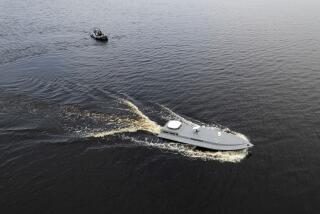Black Sea Fleet Confrontation Cooled Off : Nationalism: Russia and Ukraine agree to name a commission to settle their claims and divide up the ships.
- Share via
MOSCOW — Russia and Ukraine on Thursday backed away from their angry confrontation over the future of the powerful Black Sea Fleet of the old Soviet navy and agreed that a joint commission should resolve the dispute.
After weeks of heightening tensions, Presidents Boris N. Yeltsin of Russia and Leonid Kravchuk of Ukraine ended their “battle of decrees” and said they will suspend the orders that each had issued seizing the whole fleet for his country.
The two presidents also said they will create a bilateral commission to settle their countries’ claims to the fleet, one of the largest in Europe, and then divide its 345 ships, 28 submarines and 159 aircraft between them.
Although Yeltsin and Kravchuk have made such agreements before only to break them under pressure from Russian and Ukrainian nationalists, the understanding reached Thursday appeared to reflect a real desire by each to escape a conflict that neither could win.
“If we have enough wisdom and calmness and if we do not act on ambitions, I believe we will be able to resolve this issue in the interests of our states and peoples,” Kravchuk said in a television interview broadcast here as well as in Kiev, the Ukrainian capital.
“Our peoples do not want to quarrel with one another, but for this we must be wise.”
Dismissed immediately as simply a “truce” by political commentators who see even deeper issues in the Russian-Ukrainian rivalry, the agreement should nevertheless ensure the unity of the Commonwealth of Independent States, which groups Russia, Ukraine and nine other former Soviet republics, for a while longer.
Under severe strains because of disputes between Moscow and Kiev, the Commonwealth is the only remaining framework that the old Soviet republics have for dealing with each other as other than totally foreign states and for resolving the conflicts that stem from their competing nationalisms.
In Ukraine, Kravchuk has been under growing pressure to take his country out of the Commonwealth, and even his supporters had come to see the Black Sea Fleet as a test of his ability to manage Russian-Ukrainian relations.
Yeltsin, already under broad attack for his radical economic reforms, found himself painfully vulnerable this week when Russian nationalists, liberals as well as conservatives, accused him of neglecting Russia’s interests in order to develop the Commonwealth and cited the uncertain future of the Black Sea Fleet as evidence.
The presidents’ move appeared, as a result, to be carefully calculated, for the joint commission they will form will include a number of ardent Russian and Ukrainian nationalists and thus put the burden of the fleet’s future on some of their harshest critics.
Only later, when a settlement has taken shape and emotions abated, are Kravchuk and Yeltsin expected to meet face to face on this issue. Their foreign ministers are expected to meet here Saturday, however, to prepare the joint commission’s talks.
Kravchuk immediately drew sharp criticism from nationalist deputies in the Ukrainian Parliament for what they see as a retreat in the face of Russian pressure.
“Our so-called president, Leonid Kravchuk, is a coward,” said Stepan Khmara, a radical nationalist. “You do not build a state by going on your knees. You have to get rid of your inferiority complex.”
Tensions eased significantly, however, at naval headquarters in Sevastopol as Russian and Ukrainian delegations agreed not to force a showdown by demanding that the fleet’s 90,000 men declare their loyalty to one country or the other.
And, instead of raising Russian or Ukrainian flags as they had earlier this week, the fleet’s 345 ships and 28 submarines will again fly the flag of the Soviet Union.
More to Read
Sign up for Essential California
The most important California stories and recommendations in your inbox every morning.
You may occasionally receive promotional content from the Los Angeles Times.













